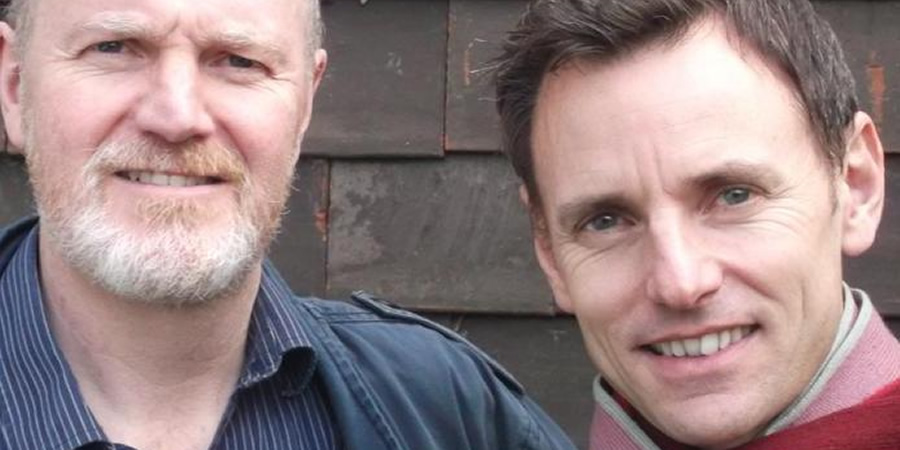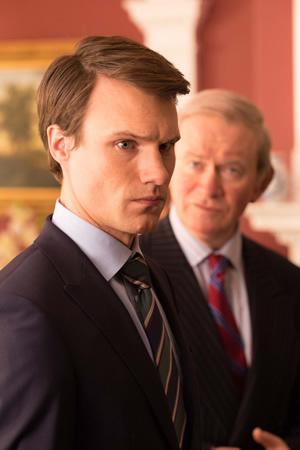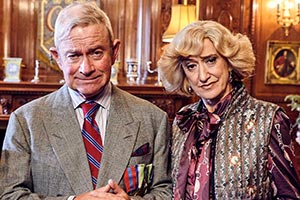Bert Tyler-Moore and George Jeffrie interview

Bert Tyler-Moore and George Jeffrie are the writers behind The Windsors. They introduce their series via this interview:
Can you explain a little about the show?
Bert: Well, it's looking at the real Royal Family, so using the real people - Will, Kate etcetera - as our characters, and presenting them in a larger-than-life, fictional soap opera. So it's the real life Windsors, but done as if they're in something like Dynasty or Dallas. It's a very heightened and very silly parody version of reality, I suppose.
George: The stories are not really drawn from their actual life, although they might have little hints of their actual life, and their characters are big embellishments of what we think of them.
Bert: Yeah, they're exaggerations. For example, we know the real Wills flies a helicopter, so we've exaggerated that to the Nth degree and have stories where our Wills is a real action hero guy flying a helicopter and saving people's lives and behaving like a Tom Cruise-type character.
So you take the public perception of these people and just make them more extreme?
Bert: With some of them we have, but not with all of them.
George: Like our Kate we made a gypsy, just as a play on the real Kate being a commoner that married into the UK's poshest family.
Bert: But we've painted our Camilla as an out-and-out cartoon villain, which isn't the public perception of the real Camilla. We imbued her with that ludicrous role because we thought it would be fun to have an arch, soap style villain. But with some other characters I think we probably may have exaggerated a public perception. Beatrice and Eugenie, for example, they come across to me as slightly dim girls who have never really had a proper job so that's what we play on.
How do you decide which of your characters is going to play 'good' and 'bad'?
Bert: Well, in the case of Camilla, there is the whole idea, often, in the papers, pieces saying "Maybe we should skip a generation and sideline Charles and Camilla, and have Will and Kate as the next king and queen". So I suppose we came up with the idea of our Camilla as the villain because, if she believes that press, she might get jealous, and hence try and plot to undermine Wills and Kate. And the other slightly villainous, soapy character is our Pippa, Kate's sister. It's not the public's perception that she's a villain, but we're lampooning our Pippa as being jealous of Kate, which in real life she may or may not be - and that motivates her ludicrous, soap style plot. That's an invention on our part, really, for the purposes of comedy and satire. Remember it's our fictional take on the Royals - it's not an observational documentary.
Why this subject, and why now?
Bert: We never really thought "Oh wow, the Royal Family are crying out to be done." They're an institution that is always there. I think we just thought it was a funny idea, and then I suppose when we started thinking about it more seriously, we realised that they hadn't really been done properly since Spitting Image, and that's a long, long time ago. That's 25-30 years ago now.
Where do you draw your inspiration from? Have you been reading celebrity magazines and the tabloids for the last year?
Bert: We have yes, yes! We looked a lot on the internet. There were all sorts of rumours on the internet. One wonderful rumour that we played on was the idea that Pippa might be having a relationship with Prince Harry. We just picked up on that from trawling the internet, and felt that maybe we could draw a lot of humour from it with our characters.
Do you have a favourite character from this series?
Bert: I think they're all our babies.
George: I like our Prince Edward, who's sort of our age group. He's a contemporary of ours, and he's often perceived as such a failure. So we've enjoyed a trip down memory lane, bringing up things people may have forgotten. Things like getting into Cambridge with a C and two D's, It's A Royal Knockout, being booted out of the marines after a couple of months. It's all in good fun. I like him a lot. They're all great, but I think he's my favourite.
Bert: I thought our Wills came off quite well. That's more because of Hugh Skinner's performance. He comes across as the real hero, the square-jawed hero.

It's got a very similar feel to your previous series Star Stories. Was that intentional?
George: No. I think that's just our style, really, when we're making satirical programmes about real people. They always lean towards being dealt with in a ludicrously heightened way, and we like to get to the funny bits as quickly as we can. I think that's just how it's come out. The idea's quite different, really. It's more of a funny soap, whereas Star Stories was more of a docu-comedy. Obviously they look a bit similar, and the tone is similar, but that might just be the writing style.
Bert: Each Star Stories was like a mini-movie, where the actual events in that person's life were quite important, whereas with The Windsors, although it's based on real life characters, the stories are much more outrageous and soaplike. That's quite a big difference.
How does the writing process work? Do you sit in the same room throughout, or work separately most of the time?
Bert: We sit in the same room the whole time, at literally every stage from thinking up the idea to working on a rough idea of an episode outline, to sitting down and writing the dialogue. We've always done it that way, everything we've written we've done like that. It seems to work.
Do you find that one of you finds the voice of one character and therefore writes more of their stuff, while the other might have an idea for a different character?
George: I think one of us might get the handle first, and if it's working , the other one will just catch it, and will jump on board. We wouldn't just go "Oh you're better at doing Charles and I'm better at doing Camilla." We get the hang of them roughly at the same time.
Do you hand in the script and that's it, or do you stay involved throughout, and go down to the set and stuff?
Bert: We've been kept very closely involved. One of us was on set every day, and we were quite closely involved with the casting process. And now, with the editing process, we're not sitting in the edit suite, but Adam, the director, and Izzy, the producer, do rough drafts of edits, and then show us, and we'll give our notes. So it's been great, we've been kept involved all through the process.
How did you guys meet?
George: We were comics, originally, many years ago, in the 1940s! At some point, in the 90s, we decided we were getting a bit old for it. And you have endless spare time, when you're a comic, and we were friends, so we used to meet up and do a few hours writing every day. And slowly that overtook the performing. We decided we preferred the writing after a while, so we just started doing that.
Bert: We really took off at the end of the 90s with Armstrong & Miller's first show. We ended up writing quite a lot for that, and I think that's when we realised that we were a lot better at this than at performing. And I think we both enjoyed it a lot more as well. With that show, we could do so much with it, it was so imaginative, what they did. It was such a great opportunity, as sketch writers, which was what we started off doing. That set us up, it was a great first job, really.
Do you ever work solo?
George: Not really, we haven't, no.
Why do so many comedy writers team up as pairs these days?
Bert: I don't think that's anything new, I think they always have. If you look at the classic sitcoms - Galton & Simpson, who wrote Hancock, Clement & Le Frenais who did The Likely Lads and Porridge. It's always been the way for writing comedy, I think because there's someone to spark off.
George: It's sort of reassuring, if you do a rubbishy joke and the other person laughs,. And you think maybe it's not that rubbish.
Bert: And also you can get into little riffs, I think. If you're riffing away with someone, it's almost as if the sum is greater than the parts. The riff takes over, you're having a laugh, you're joking away, and that spills into something you couldn't just have planned or worked out on your own. There's a dynamic at work between the two of you.
George: And also, when it grinds to a halt, it's quite handy to have someone go "Well actually, what about this?" Whereas if you're on your own, you might just think "I'll go and watch telly". So it just jogs you out of your torpor, really.
Your lampooning what is, for many, a much loved institution? Do you think the show will upset people?
George: I'm hoping it'll bring down the monarchy. And I'm actually building a bunker. I'll be ready for the revolution.
Bert: I think it's bound to - there are some people who are so in love with the Royals that they can't fail to be.
George: I don't think people will mind too much. I think it'll be water off a duck's back to everyone, really. I may be wrong.
Bert: It'll be fascinating to find out. Who knows? I can imagine the headlines now, but that's not the same as people at large actually being upset.
George: Despite obviously mocking the Royals, it's also got quite a bit of warmth in it. We didn't want to make our characters dislikeable, quite the opposite really. And there's a twist at the end which might surprise people.
Have you considered the possibility that you may end up imprisoned in the Tower?
George: With property prices, that would be ideal. Nice little flat in the Tower of London.

